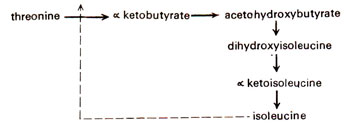Feedback inhibition
In some cases, the end product of a particular biosynthetic pathway gets accumulated if not utilized. Sometimes such an accumulation may stop further synthesis of this substance. For instance, if E. coli cells growing normally are supplied with amino acid isoleucine, it blocks activity of the enzyme involved in the first step. This inhibition is due to binding of isoleucine to enzyme threonine deaminase (Fig. 35.27). This mechanism of regulation of enzyme activity is known as feedback inhibition. If the first enzyme is blocked in this case, it may not be necessary to check the other intermediate enzymes, since there will be no accumulation of intermediate products.
The end product in the above case perhaps acts through allosteric transformation of the enzyme, as a result of which the site of activity of the enzyme gets transformed in such a way that it can not perform its catalytic function. This would mean that in feedback inhibition the enzyme does not function, while in repression no mRNA synthesis and hence no enzyme synthesis takes place. Therefore, this is not a case of control of gene activity, but gene expression is controlled only at a post-translational level.





